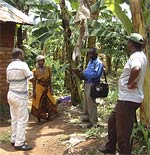|
AID IN A MODERN WAY
Since the early 1960s there has been a growing market in Europe, Japan and the USA for products grown in a sustainable manner and without the use of agro chemicals. The organic market has grown from US$ 13 billion in 1998 to US$ 25 billion in 2005. This is due to the increasing environmental concerns by the consumers in these developed countries. As such, they are willing to pay premium prices for certified organic products. Slowly but surely, governments, as well as development cooperatives, are recognising the contributions that organic agriculture can make to environmental, health, bio-diversity and food security issues.
The aforementioned situation made for an ideal opportunity for African countries to find premium export markets. Thus, the EPOPA programme - Export Promotion of Organic Products from Africa - was birthed by SIDA in 1997.
The first two phases of EPOPA-programme from 1997-2001 and from 2002-2004 proved to be successful. In 2004, more than 29,000 smallholders participated. It is encouraging to note that the first two projects initiated by EPOPA, involving another 30,000 farmers, are self-sustaining to this day.
The price that the farmers receive for their cash crops is 15 to 40 percent higher. Many farmers report a significant increase in productivity due to more intensive crop management measures. The farmers also produce their own food organically.
The farmers also appreciate the extra attention given to them by the extension workers and generally respond to that by caring more about farming.
The higher prices are not achieved by the organic qualification only but also by better quality products and in some cases, by more direct trading structures. In one project, the exporter is also on the fair trade coffee register. These three aspects together resulted in a 50 to 100 percent increase in income.
An interesting trend is that higher organic prices create an upward
trend for the conventional price, normal middlemen have to follow
the better price. Sometimes they even started to pay for better
quality, too.
|
|

Inspection of coffee in Bukoba, Tanzania
|
| |
|
|


